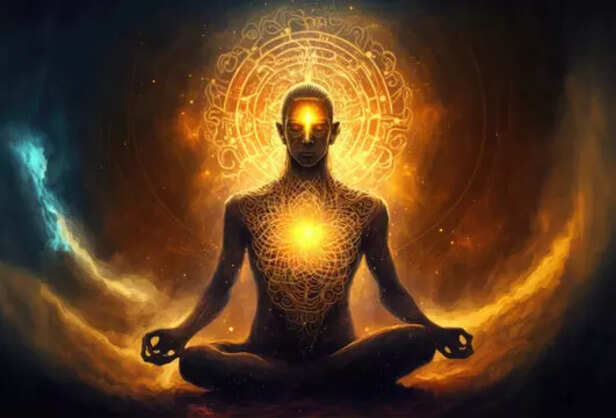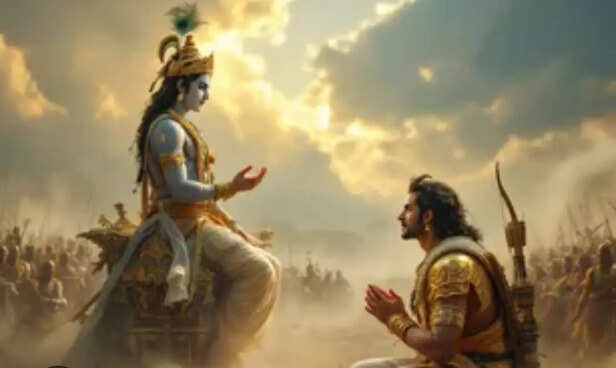‘I’, the Self, Is Self-Evident; All Else Is Evident to the Self—Essence of the Entire Bhagavad Gita
Ankit Gupta | May 12, 2025, 14:29 IST
The Self is self-aware, and all awareness is rooted in the Self. All practice—be it devotion, action, or meditation—is aimed at remembering this forgotten truth.
In the vast spiritual landscape of the Bhagavad Gita, where karma, bhakti, and jnana converge in a sublime synthesis, one subtle truth stands as the axis around which all teachings revolve: "I", the Self, is self-evident. Everything else becomes evident only because of this Self. This realization is the Gita's ultimate gift—liberation through self-knowledge.
As Shri Krishna guides Arjuna through despair, doubt, and duty, he constantly nudges him toward this awakening. The Gita is not just a book of ethics or action—it is a mirror held before consciousness, inviting us to see our true nature beyond name, form, and circumstance.

The Self (Ātman) requires no proof. It is the light by which all things are known, but it is not known like other things. It is known as oneself, not by something else. Just as light reveals objects without needing another source, the Self reveals all experiences while being self-revealed.
Shri Krishna hints at this in Chapter 2:
"न जायते म्रियते वा कदाचि न्नायं भूत्वा भविता वा न भूयः। अजो नित्यः शाश्वतोऽयं पुराणो न हन्यते हन्यमाने शरीरे॥" (2.20)
“The Self is never born, nor does it ever die; nor once having been, does it cease to be. It is unborn, eternal, everlasting, and ancient. It is not slain when the body is slain.”
This unborn nature of the Self is not a mystical claim—it is a direct observation in silence. The fact that I am aware is undeniable. Before any thought, emotion, or sensory input, there is this simple, formless, undeniable I-am-ness.
You don’t “see” the Self—you are the Self. You don’t become aware of it—you realize it has always been there, unchanging, witnessing every thought, action, and dream.

Once the Self is known as the seer, the world is seen in its proper place—not as an absolute reality, but as that which appears to the Self.
Shri Krishna explains in Chapter 13:
"क्षेत्रज्ञं चापि मां विद्धि सर्वक्षेत्रेषु भारत।" (13.3)
“Know Me as the Knower of the field in all fields, O Bharata.”
Here, the field (kṣetra) is the body-mind-complex, and the kṣetrajña is the awareness within—the witness. Krishna is declaring that He is that witness in every being. Therefore, Self and Krishna are ultimately the same.
Just as all images on a screen exist only due to the screen, all experiences arise only because of the Self. Yet, the Self remains untouched. Pleasure, pain, memory, body—they come and go, but the witnessing awareness is ever-present.
When we dream, the entire world of the dream is experienced by the mind, yet the mind is lit by awareness. When we wake, we realize the dream was not real—but what was present in both dream and waking? Awareness. That’s the Self.

Arjuna’s collapse on the battlefield is symbolic of our existential confusion. Despite being capable, dutiful, and righteous, he is torn apart by conflicting identities: warrior, brother, disciple, and seeker.
Krishna does not merely give him moral pep talk—he leads him into deeper inquiry:
"अशोच्यानन्वशोचस्त्वं प्रज्ञावादांश्च भाषसे। गतासूनगतासूंश्च नानुशोचन्ति पण्डिताः॥" (2.11)
“You grieve for those who should not be grieved for, and yet you speak words of wisdom. The wise do not grieve for the living or the dead.”
Krishna uses the occasion to reveal the eternal Self that is untouched by birth and death. The warrior's courage is not enough—what Arjuna needs is the courage of Self-realization, to see himself not as body or role, but as the deathless consciousness.
Through surrender (śaraṇāgati) and inquiry, Arjuna is led to the truth of his Self—just as each of us must be.

The ultimate promise of the Bhagavad Gita is not heavenly rewards or moral perfection—it is freedom. Freedom not in the outer sense, but as the realization that you are already free, once you cease identifying with the transient.
"ब्रह्मभूतः प्रसन्नात्मा न शोचति न काङ्क्षति। समः सर्वेषु भूतेषु मद्भक्तिं लभते पराम्॥" (18.54)
“One who is established in Brahman, whose mind is serene, who neither grieves nor desires, who is the same toward all beings—such a one attains supreme devotion to Me.”
This Self-realization (ātma-jñāna) is not cold knowledge—it is the gateway to love, peace, and true action. The knower of the Self becomes fearless, compassionate, and wise. The ego no longer dominates; the light of Self shines through effortlessly.
The Bhagavad Gita speaks to the part of you that is not confused, not weak, and not transient. It speaks to the Self behind the masks. Its core message is simple yet luminous:
You are not the mind. You are not the body. You are That which knows them.
The ‘I’ is self-evident. All else becomes known in its light. To abide in this Self is the goal of life. And Krishna, as the Guru within, constantly calls us back to this remembrance:
"मां अनुस्मर युध्य च" – “Remember Me and fight.” (BG 8.7)
Act, love, strive—but remember who you are. The Gita is not just a scripture—it is the whisper of eternal awareness in the battlefield of life.
Know the Self. Be the Self. All else shall follow.
As Shri Krishna guides Arjuna through despair, doubt, and duty, he constantly nudges him toward this awakening. The Gita is not just a book of ethics or action—it is a mirror held before consciousness, inviting us to see our true nature beyond name, form, and circumstance.
The Self is Self-Evident (Svataḥ Siddha)

Selfless Self (Image Credit: Pixels)
The Self (Ātman) requires no proof. It is the light by which all things are known, but it is not known like other things. It is known as oneself, not by something else. Just as light reveals objects without needing another source, the Self reveals all experiences while being self-revealed.
Shri Krishna hints at this in Chapter 2:
"न जायते म्रियते वा कदाचि न्नायं भूत्वा भविता वा न भूयः। अजो नित्यः शाश्वतोऽयं पुराणो न हन्यते हन्यमाने शरीरे॥" (2.20)
“The Self is never born, nor does it ever die; nor once having been, does it cease to be. It is unborn, eternal, everlasting, and ancient. It is not slain when the body is slain.”
This unborn nature of the Self is not a mystical claim—it is a direct observation in silence. The fact that I am aware is undeniable. Before any thought, emotion, or sensory input, there is this simple, formless, undeniable I-am-ness.
You don’t “see” the Self—you are the Self. You don’t become aware of it—you realize it has always been there, unchanging, witnessing every thought, action, and dream.
Everything Is Evident to the Self (Sarvam Prakāśyate)

Self Shapes Your Identity
Once the Self is known as the seer, the world is seen in its proper place—not as an absolute reality, but as that which appears to the Self.
Shri Krishna explains in Chapter 13:
"क्षेत्रज्ञं चापि मां विद्धि सर्वक्षेत्रेषु भारत।" (13.3)
“Know Me as the Knower of the field in all fields, O Bharata.”
Here, the field (kṣetra) is the body-mind-complex, and the kṣetrajña is the awareness within—the witness. Krishna is declaring that He is that witness in every being. Therefore, Self and Krishna are ultimately the same.
Just as all images on a screen exist only due to the screen, all experiences arise only because of the Self. Yet, the Self remains untouched. Pleasure, pain, memory, body—they come and go, but the witnessing awareness is ever-present.
When we dream, the entire world of the dream is experienced by the mind, yet the mind is lit by awareness. When we wake, we realize the dream was not real—but what was present in both dream and waking? Awareness. That’s the Self.
The Crisis of Arjuna and the Discovery of the Self

Final Solution
Arjuna’s collapse on the battlefield is symbolic of our existential confusion. Despite being capable, dutiful, and righteous, he is torn apart by conflicting identities: warrior, brother, disciple, and seeker.
Krishna does not merely give him moral pep talk—he leads him into deeper inquiry:
"अशोच्यानन्वशोचस्त्वं प्रज्ञावादांश्च भाषसे। गतासूनगतासूंश्च नानुशोचन्ति पण्डिताः॥" (2.11)
“You grieve for those who should not be grieved for, and yet you speak words of wisdom. The wise do not grieve for the living or the dead.”
Krishna uses the occasion to reveal the eternal Self that is untouched by birth and death. The warrior's courage is not enough—what Arjuna needs is the courage of Self-realization, to see himself not as body or role, but as the deathless consciousness.
Through surrender (śaraṇāgati) and inquiry, Arjuna is led to the truth of his Self—just as each of us must be.
Liberation Through Knowing the Self (Jñāna Moksha)

Knowing the Knower
The ultimate promise of the Bhagavad Gita is not heavenly rewards or moral perfection—it is freedom. Freedom not in the outer sense, but as the realization that you are already free, once you cease identifying with the transient.
"ब्रह्मभूतः प्रसन्नात्मा न शोचति न काङ्क्षति। समः सर्वेषु भूतेषु मद्भक्तिं लभते पराम्॥" (18.54)
“One who is established in Brahman, whose mind is serene, who neither grieves nor desires, who is the same toward all beings—such a one attains supreme devotion to Me.”
This Self-realization (ātma-jñāna) is not cold knowledge—it is the gateway to love, peace, and true action. The knower of the Self becomes fearless, compassionate, and wise. The ego no longer dominates; the light of Self shines through effortlessly.
The Gita’s Whisper to the Soul
You are not the mind. You are not the body. You are That which knows them.
The ‘I’ is self-evident. All else becomes known in its light. To abide in this Self is the goal of life. And Krishna, as the Guru within, constantly calls us back to this remembrance:
"मां अनुस्मर युध्य च" – “Remember Me and fight.” (BG 8.7)
Act, love, strive—but remember who you are. The Gita is not just a scripture—it is the whisper of eternal awareness in the battlefield of life.
Know the Self. Be the Self. All else shall follow.
